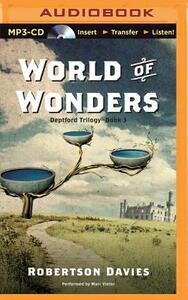Take a photo of a barcode or cover
emotional
mysterious
reflective
sad
slow-paced
Plot or Character Driven:
Character
Strong character development:
Yes
Loveable characters:
Complicated
Diverse cast of characters:
Yes
Flaws of characters a main focus:
Yes
Explaining how Paul Dempster became Magnus Eisengrim, this last book in the Deptford trilogy is an account of how personality develops. The title "World of Wonders" seems ironic to me, as it explores the dingy reality behind a seemingly magical façade. A fine metaphor. The ultimate conclusion that myth, illusion, and faith are our desperate attempts to reconcile the cruelness of the world (and are pretty effective) left me with a sense of tragic fulfillment. Autobiography (the vehicle for Davies' thematic explorations) is seldom truth, or maybe there is no truth, or maybe there are far too many truths floating around to find such a word useful at all.
Concealment runs through this story as well, manifested in the frightening automaton Abdullah, in Eisengrim's un-billed work as Sir John's double, as the giant head that prophesied (posthumously) the death of Boy Staunton. These are all symbols for how we clothe ourselves inside our own fabrications, whether consciously or not, with the result that our true (there's that word again) selves are withheld from those around us.
Concealment runs through this story as well, manifested in the frightening automaton Abdullah, in Eisengrim's un-billed work as Sir John's double, as the giant head that prophesied (posthumously) the death of Boy Staunton. These are all symbols for how we clothe ourselves inside our own fabrications, whether consciously or not, with the result that our true (there's that word again) selves are withheld from those around us.
About a third of the way through this book I consulted a tree oracle for advice on personal growth. The final card in the spread was “The Dry Tree.” The explicit advice was “Invest your energies elsewhere.”
This made a huge impact on me. So many oracle decks these days give far different advice along the lines of “trust your intuition”, “the divine goddess is working within you”, “you are on the right path”, “do not be afraid to speak your truth”, and so on.
The Dry Tree appears in the Gospel of Matthew (21:19). “And when he [Jesus] saw a fig tree in the way, he came to it, and found nothing thereon, but leaves only, and said unto it, Let no fruit grow on thee henceforward for ever. And presently the fig tree withered away.”
That afternoon I resumed World of Wonders and read this passage: “We’re all sweetness and light now, in our professions of belief. We have shut our minds against the Christ who cursed the fig-tree.”
The speaker is Magnus Eisengrim, whose spoken autobiography forms the core of this novel, but I think Robertson Davies would appreciate this example of synchronicity.
Did the advice “Invest your energies elsewhere” apply to my reading of World of Wonders? Possibly. If so, I ignored the advice and finished the book. I had to force myself to pick it up every day and routinely read 30 pages in order to do so but, on the whole, I’m glad I did.
I like Robertson Davies as an author. A lot of his interests overlap with mine. I studied books on conjuring when I was younger (both the theatrical and occult kinds). I invested a lot of time in learning about the lives of the saints. I studied Jung’s writings to learn about archetypes and the collective unconscious. I’ve read books like The Hero with a Thousand Faces and I’m interested in how myth interweaves with our everyday lives.
But I didn’t much enjoy this novel or the one that came before it, The Manticore. I think they both lacked suspense and narrative tension. There was a lot of irony but not much humour. I felt I was missing something, some hidden subtext that must have been baked into the trilogy as a whole but that I was failing to grasp.
Robertson Davies is so interested in subtext that he brings our attention to it and has Dunstan Ramsay, the chief narrator, explain it to Magnus:
“It’s a term modern theatre people are very fond of. It’s what a character thinks and knows, as opposed to what the playwright makes him say.”
Both Dunstan and the real author, Robertson Davies, are of course modern theatre people. The title of the first novel in this trilogy “Fifth Business” is also a theatrical term and Davies was a playwright before he was a novelist.
Magnus’s autobiography provides the subtext to the film he is making. But what is the subtext of the novel?
Well, I think it’s what Robertson Davies thinks and knows, as opposed to what he makes his five fictional narrators and other characters say.
Quite what that is would take a very long thesis to expound. There’s no doubt he’s a very wise old bird who has read a lot of books, garnered a lot of honorary doctorates (26!) and done a lot of thinking about psychology, myth and religion.
I think if pressed I would say the subtext is that small actions can have large consequences and that the human mind is a very complex and fragile mechanism. The humblest of individuals can exert great influence and the most powerful can be humbled in an instant.
It’s a book I’m glad I have read and I will probably think about in the weeks ahead. But it was a bit like reading a novel that had somehow got mixed up with a doctoral thesis on Jungian analysis. I need to to go looking for entertainment now.
This made a huge impact on me. So many oracle decks these days give far different advice along the lines of “trust your intuition”, “the divine goddess is working within you”, “you are on the right path”, “do not be afraid to speak your truth”, and so on.
The Dry Tree appears in the Gospel of Matthew (21:19). “And when he [Jesus] saw a fig tree in the way, he came to it, and found nothing thereon, but leaves only, and said unto it, Let no fruit grow on thee henceforward for ever. And presently the fig tree withered away.”
That afternoon I resumed World of Wonders and read this passage: “We’re all sweetness and light now, in our professions of belief. We have shut our minds against the Christ who cursed the fig-tree.”
The speaker is Magnus Eisengrim, whose spoken autobiography forms the core of this novel, but I think Robertson Davies would appreciate this example of synchronicity.
Did the advice “Invest your energies elsewhere” apply to my reading of World of Wonders? Possibly. If so, I ignored the advice and finished the book. I had to force myself to pick it up every day and routinely read 30 pages in order to do so but, on the whole, I’m glad I did.
I like Robertson Davies as an author. A lot of his interests overlap with mine. I studied books on conjuring when I was younger (both the theatrical and occult kinds). I invested a lot of time in learning about the lives of the saints. I studied Jung’s writings to learn about archetypes and the collective unconscious. I’ve read books like The Hero with a Thousand Faces and I’m interested in how myth interweaves with our everyday lives.
But I didn’t much enjoy this novel or the one that came before it, The Manticore. I think they both lacked suspense and narrative tension. There was a lot of irony but not much humour. I felt I was missing something, some hidden subtext that must have been baked into the trilogy as a whole but that I was failing to grasp.
Robertson Davies is so interested in subtext that he brings our attention to it and has Dunstan Ramsay, the chief narrator, explain it to Magnus:
“It’s a term modern theatre people are very fond of. It’s what a character thinks and knows, as opposed to what the playwright makes him say.”
Both Dunstan and the real author, Robertson Davies, are of course modern theatre people. The title of the first novel in this trilogy “Fifth Business” is also a theatrical term and Davies was a playwright before he was a novelist.
Magnus’s autobiography provides the subtext to the film he is making. But what is the subtext of the novel?
Well, I think it’s what Robertson Davies thinks and knows, as opposed to what he makes his five fictional narrators and other characters say.
Quite what that is would take a very long thesis to expound. There’s no doubt he’s a very wise old bird who has read a lot of books, garnered a lot of honorary doctorates (26!) and done a lot of thinking about psychology, myth and religion.
I think if pressed I would say the subtext is that small actions can have large consequences and that the human mind is a very complex and fragile mechanism. The humblest of individuals can exert great influence and the most powerful can be humbled in an instant.
It’s a book I’m glad I have read and I will probably think about in the weeks ahead. But it was a bit like reading a novel that had somehow got mixed up with a doctoral thesis on Jungian analysis. I need to to go looking for entertainment now.
As usual, the conceit of the storytelling doesn't work for me at all -- so clunky -- but the characters are engaging and fascinating. I like that these novels are so much about memory, what we choose to tell, what we falsely remember, what we refuse to remember, and what motives might underlie unreliable narration -- and also about how much and how little those issues matter to the various people involved.
funny
mysterious
reflective
slow-paced
Plot or Character Driven:
A mix
Strong character development:
No
Loveable characters:
Yes
Diverse cast of characters:
Yes
Flaws of characters a main focus:
No
Robertson Davies has a very unique sense of humour which comes through very subtly in this book (as in all of his others). It is very Canadian, and so may not be a book for everyone. This is also the third part of a trilogy and, although it can stand on its own, it would definitely be worth reading the other two first.
This was definitely my least favorite of the trilogy. It didn't grab my attention the way the other two did, and I didn't feel myself caring for or empathizing with the main character in this novel. I'm also not sure I like the way the story was told this time. Overall, it was a decent trilogy, but I don't think this book added much to the series.
Fifth Business was a masterpiece, and The Manticore is a fantastic experiment. The World of Wonders is just a follow-on and wrap-up. Other books have done magicians and circus life better.
Although not as dull as the first in the trilogy, this was still hard to get through. Not a fan of this series but couldn't get this far and not finish. This went closer to the first of the series than the second, almost making the second book unlike the rest of the series. Wouldn't read again or recommend to a friend.


